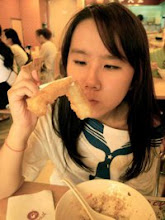
This is a love story set at the turn of the millennium in Milan. It is and it isn’t. It is a love story, but not so much one with the flourishes and the grandness of a Romeo and Juliet tragedy. It’s a story about transgression, about suppression, about clouds and sunlight and stifling air and finally one woman’s awakening. I Am Love is a story of immeasurable beauty; the story of Emma Recchi, adapted child of the Italian bourgeoisie, a woman weighed down by the responsibilities of the world yet pure and naive as a child.
This is also a story about breakdown. We are voyeurs, peaking through our fingers into the titillating lives of the Recchi family, a family of haute conservatives teetering on the brink of disaster. There’s a stifling air to the beginning scenes of the movie. Those flourishing letters and classical, haunting score only add to the eerie datedness and unease that encapsulates the Recchi family’s ceremonial dinner. The mise-en-scene is washed out; drab, grey slushy snow of a Milanese winter. The family goes back and forth with empty banter and monetary matters, mundanity captured in Luca Guadagnino’s long, shivering takes.
But everything steps into the sunlight when Emma Recchi’s eyes meet Antonio Biscaglia’s, and Tilda Swinton’s character falls for her son’s best friend. It’s theatrical but romantic, he with his seductive culinary prowess and she slowly slipping out of a stylish but stifling blue Hermes. Thirty minutes in, they tumble into the soft glow and pastel florals of the Nicean springtime. There’s a certain magical surrealism to it, as the cinematography over-exposes and we watch these character’s sparkle with the illumination of love.
Still something isn’t right. Something is always not right, as Guadagnino keeps reminding us in those unnerving choppy montages and swerving pans. The movie’s unease bites on and never lets go, and the wide-eyed characters fumble and the score vacillates asking what is it, what is it? And all questions are answered when Edoardo Recchi takes the fall.
Then silence. Silence in Emma Recchi’s eyes, as she slips her shoes off in the echoing hollowness of the church and gazes about her, cast in a dull, disbelieving glow. What is she thinking about now? The soft eyes of her son, the Recchi family mansion’s extravagant façade, or the warm arms of Antonio Biscaglia? It’s time for her to move into reality, our consciousness urges, and the reality of the Recchi family’s inevitable decline finally hits home. We dish out our sympathy, we feel their pain, as the gilded walls comes crumbling down and Edoardo Recchi’s round brown eyes stare into our soul and helplessly ask “Why? Why me?”
But finally none of that matters, none of what we thought or expected or what could be right. Finally all that remains is the devastating beauty of Emma Recchi’s triumph, as the music starts again and she runs faster than anyone, awake, alive, and full of energy, the stifling Milanese costume off her back, coming to a standstill in front of her gape mouthed family in only capris and a tracksuit. She hesitates, and her daughter smiles back at her with tears streaming down her face. There is one second-- and then she is gone.
We laugh. We cry.
She is free.

